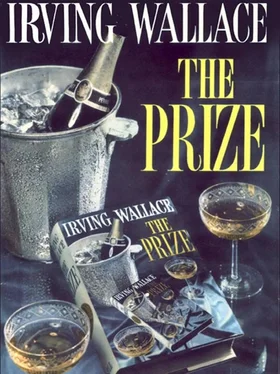From the first day, they felt that they belonged in this isolated, idyllic place, and their feeling of having come home again survived even the pain of Harriet’s second miscarriage in her fifth month. Not long after that heartbreak, the routine was once more pleasant and productive. Craig wrote furiously on his typewriter in the mornings, and again after lunch until two o’clock in the afternoon. Then he would read in the back garden, or hit golf balls, or snip at his hedges and plant in his gardens. Often, he would drive into town to pass the time with Lucius Mack, or look in on Randolph ’s pool hall to learn the baseball scores from Chicago or play a game of snooker, or pick up Dr. Marks and go for a swim at Lawson Lake. Harriet joined the Ladies’ Aid Society, and exchanged visits with the faculty wives at Joliet, and sometimes she worked with the summer repertory company at Lawson Lake in Marquette County. They belonged to the Lawson Country Club, and faithfully attended the Friday night dances, and when they wanted more excitement, they spent their weekends in Milwaukee or Chicago.
Until Harriet’s parents moved to California, they came up frequently from Springfield. Eventually, they were supplanted by Harriet’s sister Leah, who had graduated from Wisconsin University and was teaching in a school on Chicago ’s North Side. In the four years of Leah’s comings and goings, Craig was hardly aware of her. He knew that she was in awe of him as a professional writer. He knew that she worshipped her sister. He did not know, until Harriet told him, that she was unhappy. She disliked teaching. She disliked her life in Chicago. She disliked being single, yet could not make up her mind to marry the diffident, shy young man, Harry Beazley, a teacher also, to whom she had been engaged for one year.
Craig was writing well in Miller’s Dam. The Black Hole was completed in a year, and Craig was proud of it. His publisher had high hopes, and offered a first printing of 10,000 copies. But the public was not interested, and 3,000 copies were remaindered on the bargain counters. There were two play options, but they came to nothing. By then, Craig did not care, for he had researched and was already writing Armageddon .
The fourth novel was based on the actual volcanic explosion of the tropical island of Krakatoa, in the Dutch East Indies, in August of 1883. The explosion, which wiped Krakatoa off the map, had sent a tidal wave eighty feet high around the world. It dropped blocks of pumice on Australia. It capsized fishing vessels in the English Channel. It created the sounds of thunder over Texas. It broke barographs in Moscow. It blotted out 163 villages and 36,380 lives. Craig’s narrative told the story of the behaviour of a seemingly unrelated chain of people, scattered from the Strait of Sunda and Singapore to Washington, D.C., under the pressure of a natural catastrophe greater than the lava that covered Pompeii or the earthquake that brought down San Francisco.
The novel was published during Craig’s fourth year in Miller’s Dam. His parable was missed by no one. Krakatoa was a fore-shadowing of the hydrogen bomb and nuclear warfare. What made the terrifying warning and lesson acceptable was that the described event had occurred in the past, and could be digested and understood while there was still hope. Armageddon sold 40,000 copies. It received a large advance from a paperback publisher. There were nineteen foreign editions, and it sold to a television network for a two-hour dramatic spectacular.
The money came when it was most needed. Craig invested in stocks and bonds against the unpredictable future of his next novels, painted and repaired his house, allowed Harriet to buy new furniture, and indulged himself in the latest-model low-priced station-wagon.
This was their happiest year in Miller’s Dam, and the best of their eight years of married life. The month before his birthday, late that year, encouraged by Harriet, Craig accepted the one inner challenge that had so long nettled him. He had been disturbed by his own persistent retreat into the past for settings for his novels. This seemed to be an unconscious avoidance of current hard realities, a continual hiding of today’s people and their problems, and himself, too, behind period costumes. The new novel would be a modern one, and tentatively he called it Return to Ithaca .
The morning of his birthday, he allowed Harriet to read the first chapter. The afternoon of his birthday, they hiked in the meadows and talked and talked and decided to adopt a child. The night of his birthday it rained, and over his protests Harriet dragged him out to the Lawson Country Club, where he was genuinely overwhelmed by the surprise party that she had arranged. They ate, he cut the cake and opened the presents. They danced. He had four drinks and Harriet had two. He rarely drank, except at parties, and this was twice as many as he usually drank. He felt good and told Harriet that he wanted to get home and make love to her. The midnight of his birthday they slipped out of the party, and he started the station-wagon across the slippery highway back to home and bed. Ten minutes later, Harriet Craig was dead and Andrew Craig lay unconscious over the broken steering wheel of the new station-wagon.
It was Leah Decker who buried Harriet, and attended Craig in the Joliet hospital, and it was Leah who brought him back to the empty, mocking house. In the months that he was in bed, and then on crutches, he was neither depressed nor moody. His head was vacant, unthinking, and he performed like a post-lobotomy case. Leah was always present, cleaning, sewing, cooking, and listening when he wanted to talk. Once, when his convalescent period was almost over, she said that she would be away overnight. She drafted Lucius Mack to stay with him.
When Leah returned, he remembered to ask where she had been. ‘ Chicago,’ she said.
‘What were you doing there?’
‘I gave up my apartment. I packed my things and had them sent here.’
‘What about your job?’
‘Oh, I quit that two weeks after the accident. I didn’t like it anyway.’
‘What about your young man-Beazley-Harry Beazley?’
‘He’ll manage.’
‘Aren’t you engaged?’
‘Not really. Harriet used to call it that. Harry’s all right. I’m not sure he’s my type. But anyway-he might come up here in the summer, for a week, when school’s over.’
‘It’s not right, Lee. I don’t want you in bondage.’
‘It’s not bondage. It’s what I want. You need me.’
‘Yes. But there’s no reason to turn over your whole life.’
‘I’m doing what I want to do.’
‘I don’t like it. It’s not fair. I can never repay you.’
‘Just get well and write again. That’s all I want.’
In the three years that followed, they had never discussed her leaving again. In those years, Craig was not ever sure if he needed Leah, because he needed someone, or if she had made herself indispensable to him, because she needed someone. Certainly, when he had laid aside his crutches, he had not laid them away at all, because figuratively he still had two more. One was Leah. The other was whisky.
The worst period came when Dr. Marks withdrew the sleep-inducing drugs, and when Craig was well and on his feet. It was then that the full impact of his loss hit him. Harriet’s departure from his life had been too unreal to accept, and when he was unwell, and filled with sedatives and sleeping pills, he did not have to accept it. But now he was ready for her again, restored, clear-headed, and she would not come home. No matter where he looked, she was not there. She was in a hole in the ground, as inanimate and wooden as the casket that enclosed her, and there she would be for the rest of his life and for all eternity. The reality was so incredible that he wanted to weep. He could not sleep, and when he slept, he would not wake. He breathed because he did not know how to stop breathing, and he lived only for the passing of the hours and the days. He had no patience for his work or for Leah or for his old friends and old routine.
Читать дальше












